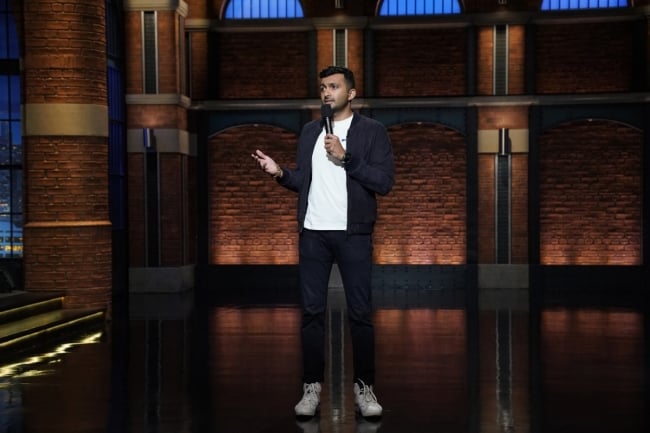You have /5 articles left.
Sign up for a free account or log in.

Nimesh Patel performs on "Late Night With Seth Meyers"
Getty Images
The Asian American Alliance at Columbia University last week interrupted an act by a relatively prominent Indian American comedian and former writer for Saturday Night Live, Nimesh Patel, during a cultural event the group sponsored.
His offense: jokes -- including some about black and gay people -- that alliance members perceived as insensitive. Organizers kicked Patel offstage in the middle of his set, criticizing his gags on race and sexual orientation but letting him deliver brief closing remarks before cutting off his microphone.
Patel was performing at cultureSHOCK, the group’s annual charity and display of Asian-related arts. The alliance was in charge of booking him. Patel did not respond to a request for comment.
The episode has prompted a campus debate about how to ensure an inclusive environment for students from all backgrounds and whether it was appropriate to kick Patel off the stage. Critics said it reinforces the stereotype of a liberal college kids -- derogatorily referred to as “snowflakes” -- who are unable to stomach mild jokes outside those that are “politically correct.”
Some professional comics, including Jerry Seinfeld and Chris Rock, previously have said they will no longer work college circuits because they consider students to be too thin-skinned for their brand of humor. Yet up-and-coming comedians can find success at lucrative campus gigs by tailoring their acts to college audiences, which tend to not enjoy jokes that target minorities.
The alliance, which directed a request for comment to a statement on its Facebook page, apologized for bringing Patel to campus.
“Patel’s remarks ran counter to the inclusive spirit and integrity of cultureSHOCK and as such, the choice was made to invite him to leave,” the group said. “We acknowledge that discomfort and safety can coexist, however, the discomfort Patel caused was unproductive in this space. We ourselves are still processing the events of cultureSHOCK and maintain different perspectives on it even within our organization. We invite and welcome dialogue concerning his remarks and our actions.”
According to one student at the set, Patel was a “train wreck.” The student, sophomore Liberty Martin, wrote about her experience in the student newspaper, The Columbia Daily Spectator.
Martin said Patel started strong, but a majority of his act was uncomfortable. Patel appeared “strangely obsessed with black people,” wrote Martin, describing him as “blatantly anti-black.” He made a joke about his black, gay neighbor having not chosen to be gay because no one would wake up in the morning and say, “This black thing is too easy, let me just add another thing to it.”
“But if you’re black and gay, you don’t need a straight South Asian guy to point out that your life is hard because you’re black and gay,” Martin wrote. “That’s not insightful -- it’s painfully unoriginal. ‘I wouldn’t choose to live with homophobia while facing racism’ has crossed the minds of queer black people, probably in a moment of distress or when faced with homophobia in their own community.”
However, Martin wrote that Patel wasn’t booted offstage because he told offensive jokes, but that he “sucked the energy out of the room” and few found him funny.
“His routine was the antithesis of what cultureSHOCK stood for,” Martin wrote. “He stepped into an uplifting atmosphere and soiled it, which is the opposite of what he was meant to do as a hired entertainer performing at someone else’s event.”
Not every student thought Patel should be kicked offstage. Malia Simon, a first-year student, wrote in the Spectator that even though she did not attend Patel’s performance, she felt that offensiveness was “inherently subjective” and comedy serves an important purpose by challenging society.
“Similarly, it seems reasonable to believe that many of those who objected to Patel’s performance would embrace an equally provocative -- or perhaps even more aggressive -- joke about the Trump administration, conservatives or others on the right,” Simon wrote. “Calling on this hypocrisy is not to say that conservatives and Trump should be spared mocking. However, this mocking only holds up so long as we’re able to maintain consistency across the board -- even if it makes us uncomfortable sometimes. We can’t propose restrictions on one side of comedy and not on the other.”
Kevin Kruger, president of NASPA: Student Affairs Administrators in Higher Education, said speakers and other acts on college campuses generally are facing heightened scrutiny. And students likely will not be able to know the entirety of a routine before seeing it, he said.
At the same time, he said students who book comics and other acts should vet them and have a general idea whether the message of the performer aligns with the groups’ mission. He encouraged students to attend a National Association for Campus Activities (NACA) showcase event, where they can preview comedians, speakers and musicians who perform for college audiences.
“College administrators would do the same vetting for potential commencement speakers or other university-sponsored entertainment,” said Kruger.




